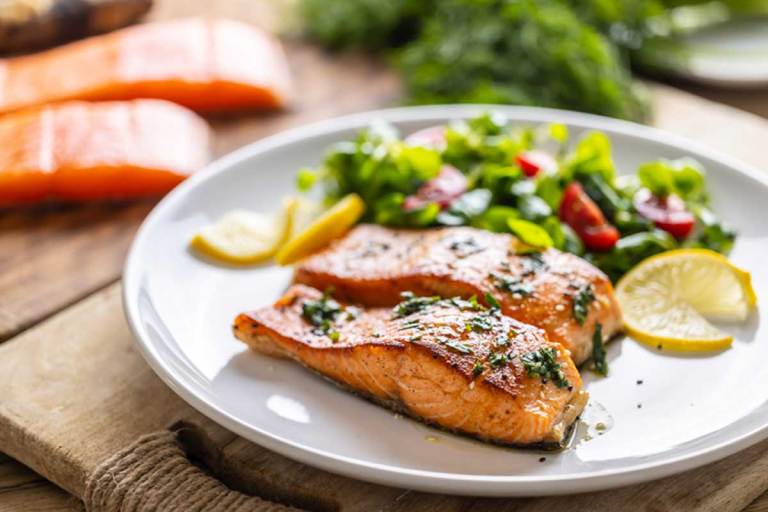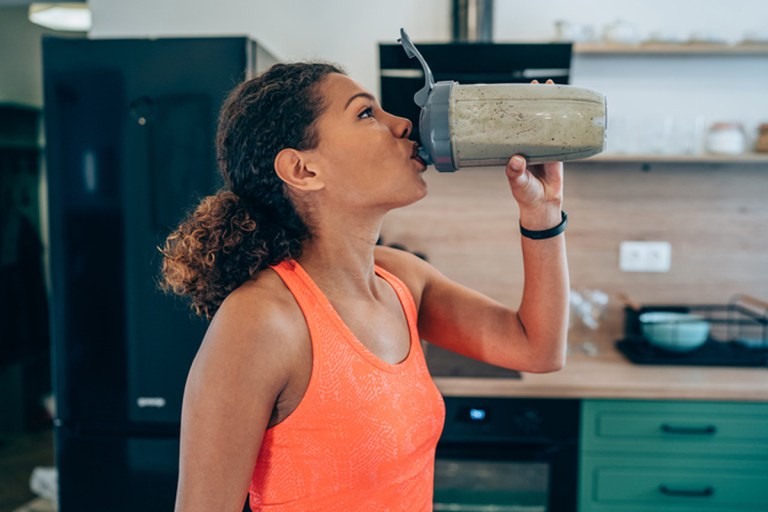Should You Drink Protein Shakes on Rest Days?
Find out how to optimize your nutrition on non-workout days to support your goals.

You might be in the habit of mixing up a protein shake right after your workout or having one stashed in the fridge ready to smash after your cooldown. Protein shakes are a popular and convenient way for athletes to get the protein they need to build and repair muscles since they’re easy to consume and digest. There’s no denying the post-workout benefits. But should you also drink protein shakes on rest days?
Here, John Christie, registered dietitian and Tonal’s Director of Applied Training Science, explains everything you need to know about rest-day nutrition, including whether you can break out your favorite protein powder on days you don’t have a workout scheduled.
Should You Drink Protein Shakes on Rest Days?
How you reach your protein intake target (more on that below) on both workout and rest days will depend on your preferences and what’s most convenient. Christie says to focus on whole-food protein sources, including lean meat, fish, poultry, eggs, tofu, greek yogurt, nuts, and beans.
However, if you’re struggling with getting enough protein from your daily meals and wondering if you should drink protein shakes on rest days, he says getting your protein from a shake is a good alternative.
“There’s no added benefit or risk of having a protein shake,” he says. “Because ultimately, as long as you’re hitting your targets, you’re good to go.”
Protein shakes can also be beneficial on rest days if you’re trying to lose weight or shift body composition by eating in a caloric deficit. Protein shakes have fewer calories compared to a typical meal so they’re a good option for getting in your protein while sticking within your calorie budget.
On the other hand, protein shakes aren’t as satiating as full meals and may leave you hungry later on. “If you’re eating a whole food, it will digest a bit more slowly and likely be accompanied by fat and carbohydrates, which will hold you over longer,” says Christie.
How Much Protein Do You Need on Rest Days?
You might think that if you sleep in one day instead of waking up early to squeeze in a workout you won’t require as much protein, but that’s not necessarily true.
“You’ll set your protein target based on your weight or lean body mass and that won’t change on workout vs. non-workout days, so staying consistent with your protein intake is ideal,” says Christie.
The recommended dietary allowance (RDA) for protein is 0.8 to 1 gram per kilogram of body weight per day for the average person, but people who are regularly active likely require more. According to a meta-analysis in the British Journal of Sports Medicine, athletes need closer to 1.6 grams of protein per kilogram of body weight per day to gain muscle mass and strength.
“You’ll set your protein target based on your weight or lean body mass and that won’t change on workout vs. non-workout days, so staying consistent with your protein intake is ideal.”
– John Christie, registered dietitian and Tonal’s Director of Applied Training Science
Since muscle growth occurs as you’re recovering from strenuous exercise, it makes sense that you should consume just as much protein on your non-workout days.
Should You Eat Fewer Calories on Non-Workout Days?
While your calorie intake shouldn’t swing wildly between workout and rest days, you may find that you tend to eat a little less on the days you don’t exercise. “It’s natural to ride the wave of more or less activity and thus varied energy needs as a result,” says Christie.
Since protein intake should stay steady, most of this small variation should come from carbohydrates. “Carbs are energy and how much energy you need on a given day might vary,” says Christie. You shouldn’t drastically alter the amount of carbs you eat on workout vs. non-workout days, but you will want to take in some extra carbs to replenish the energy lost in workouts. By keeping your carbohydrate intake relatively stable and dialing it up on workout days, you should have enough energy to fuel your workouts while achieving your goals.
Should You Change Up Your Protein Shakes on Non-Workout Days?
To add nutrients—or just more flavor—to your protein shake, you might be used to mixing in ingredients like nut butter, fruits, or vegetables. Whether or not you stick with the same recipe on rest days depends on your goals and your other meals.
Since it’s generally a good idea to eat more fruits and veggies, go ahead and throw in that handful of spinach or frozen blueberries. These add-ins up the nutrient content of your shake and are especially beneficial if you’re not getting enough greens or fruits in the rest of your diet.
Nut butter adds even more protein to your shake and may make it more filling, but they also bring more fat and calories, so it’s important to look at how these nutrients fit into your larger goals. If you’re able to reach your desired calorie and macronutrient intake with your regular meals, you might be able to skip the nut butter on rest days.
The Bottom Line
There’s nothing wrong with drinking protein shakes on your rest days if they fit your overall nutritional goals. Protein shakes are an easy and convenient method of consuming a solid dose of quick-digesting protein. Keep in mind that it’s always best to get your macronutrients from whole foods as they contain additional vitamins and minerals, but if you need a little extra protein to reach your target, feel free to fire up the blender.
The information provided in this article is for educational and informational purposes only. Individuals with pre-existing health conditions, injuries, or concerns should consult with their healthcare provider before trying a new exercise or nutrition regimen.


